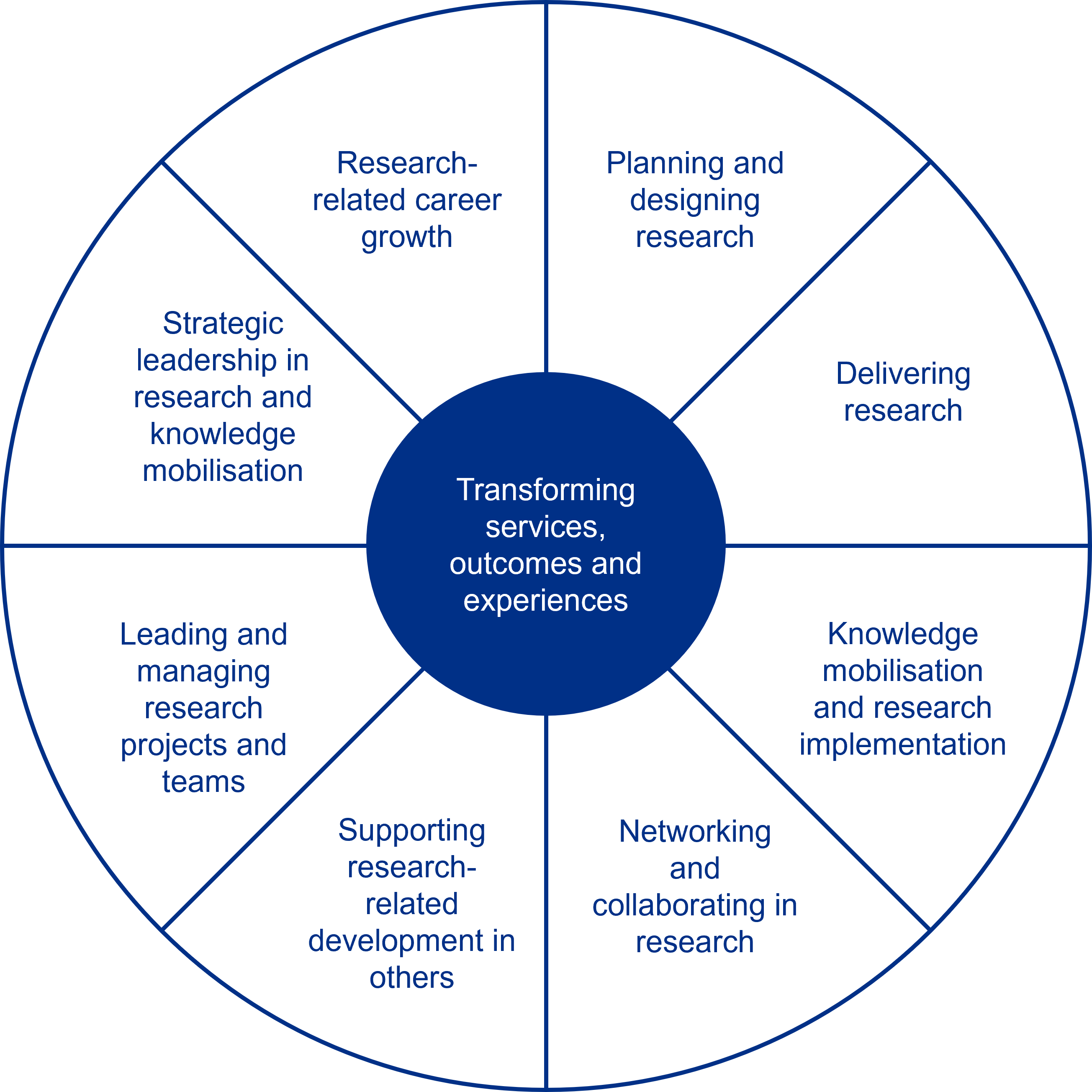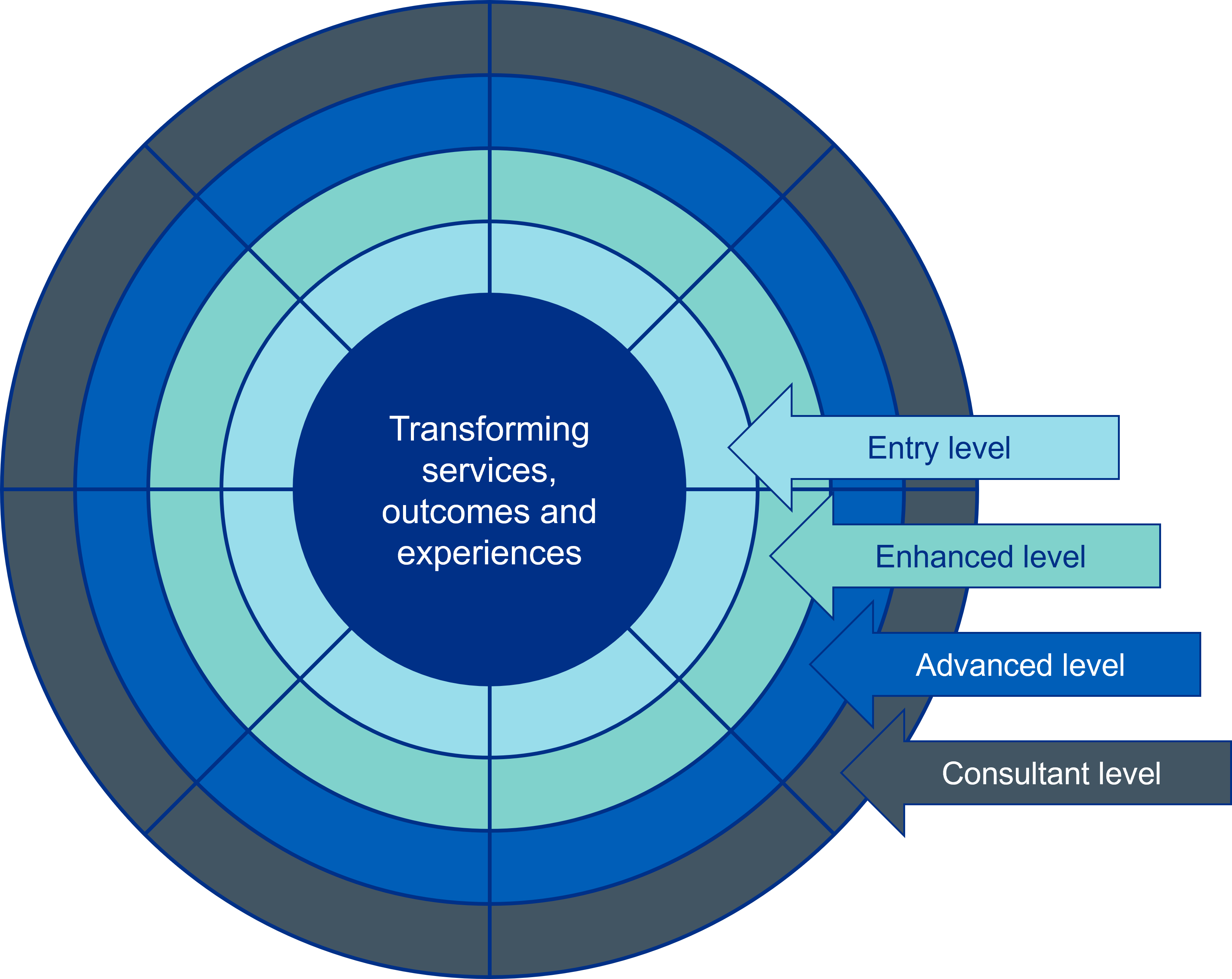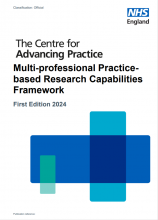Introduction
To response to the need to better serve evolving community needs and expectations the NHS has published several plans. The NHS Long Term Plan aims to give people accessing services more options, better support and properly joined-up services at the right time, in the right setting. The NHS People plan focuses on making best use of the full range of staff skills and experience. Together these plans seek to achieve the best possible outcomes and experiences for the public.
The NHS Long Term Workforce Plan sets out intentions to modernise career pathways. To support their uptake, new opportunities are emerging for staff to develop across enhanced, advanced and consultant levels of practice. This will support staff retention and expand the number of senior decision makers. Active engagement of health and care practitioners in, and with, research is of central importance. It is key to:
- ensuring safe evidence-based practice,
- further strengthening and developing the evidence base, and
- informing service design, clinical reasoning and shared decision-making with the people and communities they work alongside.
This theme is embedded in other national strategies. For example,
- A central ambition of the Chief Nursing Officer for England’s (2021) Strategic Plan for Research is to create a people-centred research environment. This will empower nurses to lead, participate in and deliver research fully embedded in practice and professional decision-making.
- Similarly, Health Education England’s (2022) Allied Health Professions’ Research and Innovation Strategy for England addresses the need to build the capability and capacity of the Allied Health Profession (AHP) workforce to engage with, implement, undertake and lead research and innovation in practice. It aims to establish a broad culture within which research and innovation is ‘everybody’s business’.
- The Chief Midwifery Officer for England’s (2023) Strategic Plan for Research centres on ensuring quality evidence and evaluation are embedded within maternity policy and programmes. It also aims to ensure that midwives’ contributions to research and building the evidence base are visible, valued, and supported by strengthening research capacity.
The central importance of engaging in, and with, research in contemporary practice is emphasised by the four pillars of practice:
- clinical (or professional) practice;
- leadership;
- facilitation of learning, and
- evidence, research and development.
Successfully transforming the workforce and service delivery requires active engagement with all four pillars by all practitioners. What that looks like, varies for individual practitioners at different stages of their careers, reflecting their particular circumstances and contexts.
There is no single ‘correct’ path to follow. However, all practitioners must make considered use of research evidence to inform decision-making. Beyond that, the emphasis might be on supporting, delivering or leading research. All contribute to the collective effort required to transform services, and the experiences and outcomes of individuals and communities. In so doing, all contribute to making the most effective use of a limited public purse. They also participate in the recruitment, retention, engagement and development of staff through more varied, exciting and rewarding career opportunities.
Purpose and intended use of the Multi-professional Practice-based Research Capabilities Framework
The purpose of the Multi-professional Practice-based Research Capabilities Framework is to:
- facilitate transformation of health and care service delivery.
- enhance outcomes and experiences of individuals and communities.
- support health and care professionals to engage in, and with, research.
The Framework elaborates incremental research capability development as one of the pillars across four levels of practice. The focus is specifically on practice-based health and care professionals. The intended audience does not extend to colleagues in medicine and dentistry, for whom well-established guidance and structures already exist.
The Framework aims to highlight and promote active involvement in, and with, research as an integral component of practice for all health and care professionals. This is the case regardless of the setting in which they work – whether primary, secondary or tertiary care, in the community, social care or elsewhere. The Framework outlines a common set of core capabilities for the diverse disciplines outside medicine and dentistry.
The expectation is that all practice-based health and care professionals develop these fundamental capabilities, relevant to their level of practice. It is, however, recognised that individuals or groups of practitioners may possess or choose to develop capabilities beyond those outlined at a particular level of practice. This might relate to different entry level qualifications. It could apply to those in research delivery leadership roles or actively pursuing a clinical or practitioner academic development pathway.
The intention of the Framework is to facilitate and accelerate the development of practice-based research capabilities, capacity and career pathways across the health and care professions.
Developing research alongside the other three pillars of practice will strengthen practitioners’ contributions to transforming services, outcomes and experiences.
The structure of the Framework is based on four levels of practice (entry, enhanced, advanced and consultant levels of practice, as set out in a later section). It will be a valuable tool for:

individual practitioners:
- when planning their professional and career development,
- to support discussions during supervision;
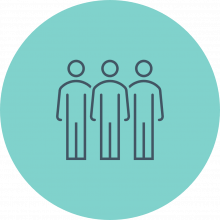
service and departmental managers when:
- job planning,
- developing job descriptions,
- informing job evaluations,
- identifying and reviewing objectives during professional development reviews;
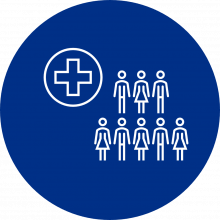
health and care organisations aiming to:
- embed a culture that values engagement in, and with, research,
- recognise, delineate and support research potential and research activity as part of everyday practice for health and care professionals;

education and training providers:
- when planning or revising the learning outcomes and content of academic award-bearing study,
- when designing other continuing professional development opportunities.
Strategic alignment of the Multi-professional Practice-based Research Capabilities Framework
The design of the Multi-professional Practice-based Research Capabilities Framework aims to ensure alignment with existing national regulatory requirements, strategies and frameworks, (as outlined in Appendix 1). The anticipation is that it will also align with any other forthcoming national research strategies in England.
The Framework is focused on health and care professionals working in England. It may be a useful reference for those in the other three nations and other health and care disciplines.
Founding and guiding principles
The following principles further underpin the development and application of the Multi-professional Practice-based Research Capabilities Framework:

The Framework outlines the common core research capabilities expected across the health and care professions. It accommodates to the greatest extent possible the variability across the different professional groupings. For example, academic entry levels, professional structures and starting points in terms of current levels of research engagement. Authors welcome national research leaders to provide further contextualisation and application of the common core capabilities with reference to individual professions, disciplines, groups or contexts.

Support workers, technicians, assistants, associate practitioners[1] and pre-registration learners make valuable contributions through engaging with and supporting research. However, this first edition of the Framework does not include those working at these levels of practice. Appendix 2 identifies documents that outline the related competencies expected of them.

The Framework sets out explicit expectations of core research capabilities in practice. It is intentionally and expressly not limited to clinical or practitioner academic capability development or pathways. Those aspiring to, or pursing, clinical/practitioner academic roles and careers should use this framework alongside existing university academic career frameworks.

The Framework draws upon robust scoping of existing uni- and multi-professional research-related frameworks and the like (see Appendix 3). When applied systematically, it can enhance:
- career development,
- clarity for those aspiring to and holding research leadership roles,
- the development of job descriptions,
- the identification and review of objectives in appraisals,
- supervision discussions,
- the review and development of research-related educational content.

Capabilities represent a step beyond competencies. Competencies outline what individuals know or are able to do in terms of knowledge, skills, attitudes and behaviours. Capabilities describe the extent to which individuals can:

The organisation of the Framework is based on eight non-hierarchical, inter-related domains identifing a range of capabilities. It elaborates the research pillar and provides a stepped approach guiding development of research capabilities across four levels of practice. Figure 1 below illustrates the relationship between the Framework and the four pillars of practice. The capabilities presented at each level incorporate and extend those that precede it. Progression to the next level involves achievement of the capabilities outlined at the previous level.

The Framework recognises the development of capabilities related to audit, service evaluation, quality improvement and knowledge mobilisation are transferrable. They may be forerunners to, and run in parallel with, progression and extension of research capabilities.
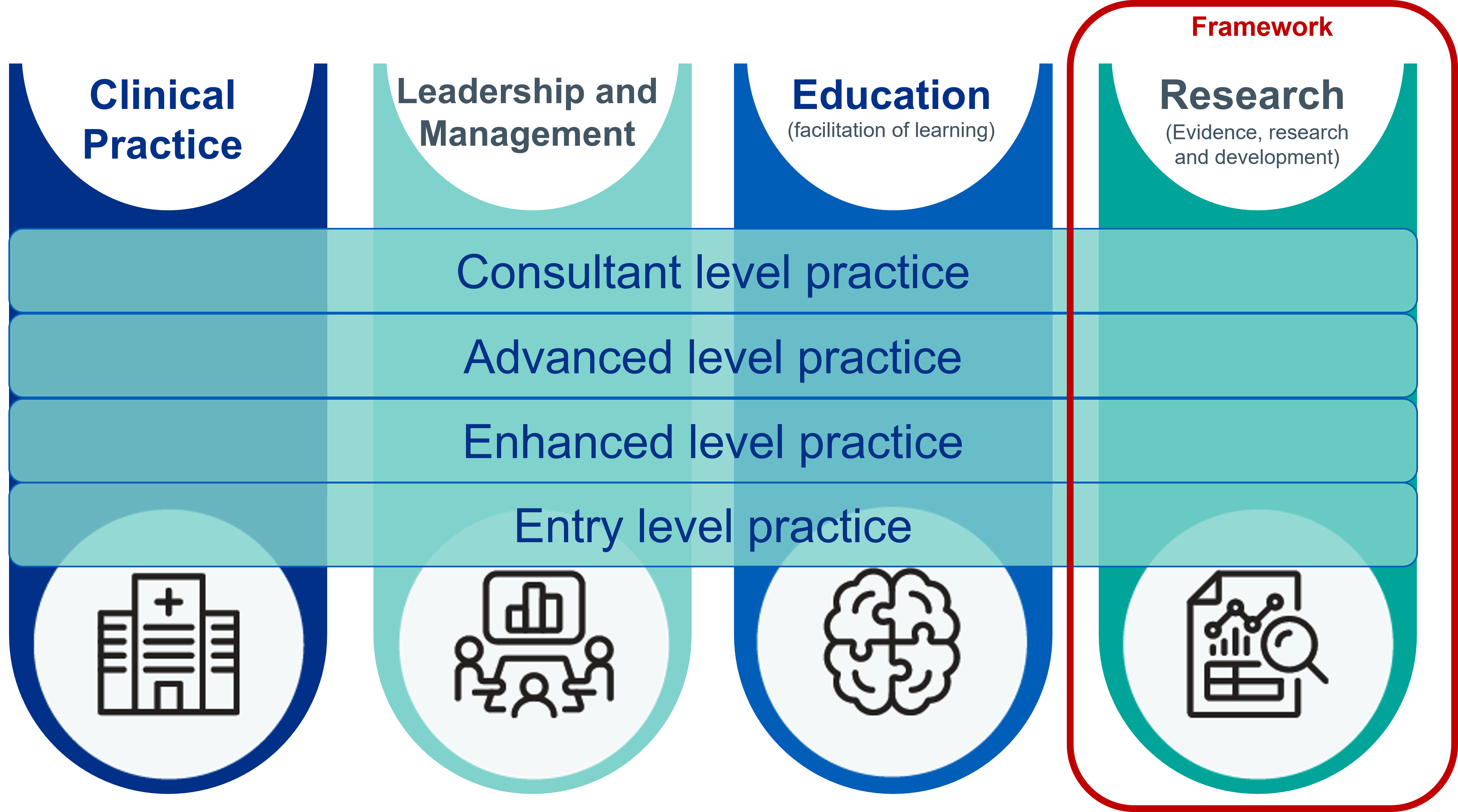
Figure 1: Situating the Multi-professional Practice-based Research Capabilities Framework within the context of the four pillars of practice

The Framework provides a structure to help guide practice-based research-related career development. There is an expectation that the application of research capabilities will ‘look’ different for each practitioner. This will reflect individual and professional circumstances and contexts.

The Framework provides a structure to assist managers when:
- considering team skills mix,
- developing job descriptions,
- undertaking job evaluations,
- identifying and reviewing objectives during individual professional development reviews.

The Framework also provides a structure to help guide services, organisations, local, regional and national systems and education providers in the development and expansion of practice-based research-related developmental and career pathways for the health and care professions, for the benefit of services and the people and communities they serve.
Defining and describing the Multi-professional Practice-based Research Capabilities Framework’s four levels of practice
Development of the Framework
Initial desk-based research scoped and collated a ‘library’ of multi- and uni-professional research capability frameworks (and similar) in England. Mapping these frameworks against the research pillars / elements of the capabilities established for entry, enhanced, advanced and consultant levels of practice. The initial draft of the Multi-professional Practice-based Research Capabilities Framework presented the reviewed, analysed and synthesised contents of 26 frameworks (see Appendix 3).
A phased approach was taken to engagement to help refine the draft Framework.
Phase 1 (spring 2023) involved national leaders of the relevant professions in NHS England, Health Education England and the National Institute for Health and Care Research. Phase 2 (summer 2023) involved a broader group of stakeholders including:
- national professional leaders and representatives within NHS England
- the National Institute for Health and Care Research
- the Council of Deans of Health
- the Council of Allied Health Professions Research
- the professional bodies for in-scope professional groups
- practitioners.
The first edition of the Multi-professional Practice-based Research Capabilities Framework considered all feedback received. Every effort was made to ensure the Framework is inclusive of as many professions as possible. A glossary of key terms is provided at Appendix 5.
Overview of structure and domains
Figure 2 shows the Framework capabilities organised into eight non-hierarchical, inter-related domains. The domains align with the evidence, research and development pillar of practice. They are to be interpreted in relation to individual roles, employment contexts and relevant professional and regulatory standards. Within each domain are a range of capabilities spanning the four levels of practice (see Figure 3). The number of capabilities within a domain has no bearing on its relative ‘importance’. The capabilities identified within each level of practice build on, and incorporate, those that precede it.
Figure 2: Eight capability domains
Figure 3: Four levels of practice
Outlining the eight capability domains
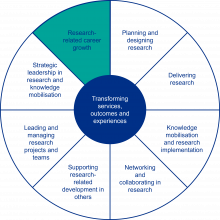
1. Research-related career growth
The focus of the Research-related career growth domain is on a proactive approach to research-related capabilities development in practice. These capabilities are the foundation for consistently embedding research into the day-to-day practice of all health and care practitioners.
2. Planning and designing research
Planning and designing domain brings together capabilities that underpin: the effective critique of research outputs, the evolving evidence base and wider sources of information / data, the development of robust protocols for individual inquiry and research projects.
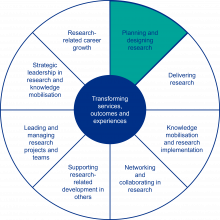
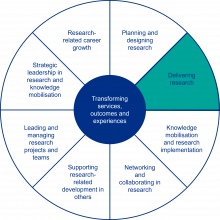
3. Delivering research
The Delivering research domain centres on capabilities related to promoting, supporting, contributing to and engaging in delivery of research. In accordance with the expectations of ethical conduct, robust governance processes and Good Clinical Practice. The capabilities apply to research developed and lead by the individual, as well as research developed and lead by others.
4. Knowledge mobilisation and research implementation
This domain focuses on making best use of existing evidence, sharing new knowledge and adding to the evidence base. It promotes approaches that optimise uptake and support the transformation of services, outcomes and experiences.
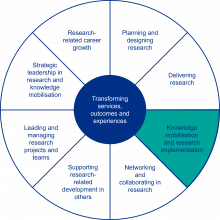
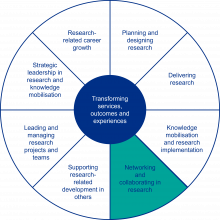
5. Networking and collaborating in research
Capabilities in this domain centre on realising the benefits of learning with and from others in research. They involve bringing together stakeholders, differing perspectives and expertise to enhance the quality, capability and capacity of research.
6. Supporting research-related development in others
Recognising the collective effort required to build research capability and capacity, is the focus of Supporting research-related development in others. It identifies capabilities associated with practitioners at any level supporting those with less experience to develop their own research-related capabilities.
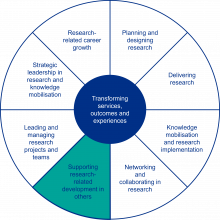
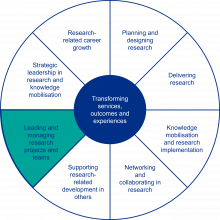
7. Leading and managing research projects and teams
These capabilities provide the foundation for effectively stepping into research leadership roles, managing associated staff and resources, and overseeing quality.
8. Strategic leadership in research and knowledge mobilisation
This domain focuses on the awareness of, influencing and leading research and knowledge mobilisation within broader organisational, national, or international contexts.
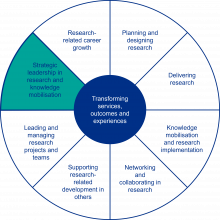
Footnotes
[1] Support workers, senior support workers, technicians, assistants, assistant practitioners and associate practitioners work with and alongside the health and care professionals and in those disciplinary areas, playing an important and growing role in delivering of safe and effective care for people accessing health and care services and wider communities.
[2] Fraser S. & Greenhalgh T. (2001) Coping with complexity: educating for capability. British Medical Journal 323, 799–803.
[3] McGee P, Inman C Eds (2019) Advanced practice in healthcare: dynamic developments in nursing and allied health professions. 4th ed. Chichester: John Wiley & Sons.
[4] Brunner et al (2018) An eHealth capabilities framework for graduates and health professionals: Mixed-methods study. Journal of Medical Internet Research 20(5), DOI: 10.2196/10229
[5] Leary (2022) The Principles of Enhanced Level Practice
[6] Support workers, senior support workers, technicians, assistants, assistant practitioners and associate practitioners work with and alongside the health and care professionals and in those disciplinary areas, playing an important and growing role in delivering of safe and effective care for people accessing health and care services and wider communities.
